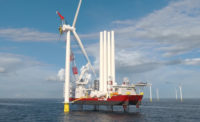Clean Energy Construction
US Offshore Wind Developers Seek New State Relief on Cost Rise

Massachusetts-based SouthCoast Wind now has filed to terminate its earlier signed power purchase agreement, with costs rising.and apply the capacity to a new round of state wind power procurement, hoping for better economics.
Image: SouthCoast Wind
Facing claimed cost impacts from still high inflation, steep interest rates and supply chain issues, east coast offshore wind energy developers are pushing to recover and avoid potential investment shortfalls based on earlier project economics.
In Massachusetts, developers of the 1.2-GW SouthCoast Wind project now have joined those of its peer project, the 1.2-GW Commonwealth Wind, in officially cancelling a power purchase deal. Regulators have not yet OK’d the firms to rebid on the projects’ capacity in the next state wind procurement in 2024, but that could happen, along with fines of up to $60 million for each, state legislator Jeffrey Roy said June 12.
“While SouthCoast has pursued, and is open to other solutions—and even after factoring in potential tax incentives—termination, and payment of a financial penalty for termination, has become the prudent commercial course to realize the project due to material and unforeseen cost increases affecting the whole offshore wind industry,” said Francis Slingsby, CEO of SouthCoast, a joint venture of Shell and Ocean Winds North America, in its early June filing in Rhode Island. It was also set to receive power from the project. This follows a 2022 termination filing to Massachusetts by Commonwealth Wind owner Avangrid.
The penalty cash would go to three state utilities, with a likely rebate to customers, Roy told the Commonwealth magazine podcast. Noting the years-long gap for projects from power deal to approved permits, the SouthCoast filing showed data from consultant Wood that wind project construction costs rose by more than 20% since 2019, with steel up 11%, in addition to higher financing costs. “It will take several years and significant investment to overcome some of these challenges,” said Wood. “Global and domestic markets have shifted to a seller’s market for the foreseeable future.”
The American Clean Power Association said in its latest offshore wind market report that levelized cost of energy rose 16% to $98 per MWh in 2022, from $84 per MWh in 2021.
NY, NJ Projects Seek Contract Adjustments
In New York, developers Orsted and an Equinor-BP team are seeking price adjustments in existing contracts, claiming those included in the state’s current offshore wind procurement should apply retroactively. Exact adjustment amounts sought are redacted, but a June 7 report in Commonwealth said one filing reference to the state’s new inflation adjustment formula “indicated a price increase of 23% would be warranted.”
The Equinor-BP filing, on behalf of its 3.3 GW of state projects, bolstered its claim with an outside cost analysis from sector consultant Wood Mackenzie that “the price of components for offshore wind projects will continue to experience significant pressure through at least the end of the decade.”
For their 920-MW Sunrise Wind project, developers Orsted and Massachusetts utility Eversource said “these unanticipated, extraordinary economic events beyond Sunrise Wind’s control have upended ... careful financial and developmental planning for the project." Sunrise Wind said it “will not receive any ‘windfall.’” Eversource is currently seeking a buyer for its project share.
“The [weighted average cost of capital] is much higher than at the time when these projects were awarded,” Orsted North America CEO David Hardy said at the firm’s June 8 investor conference, adding “we've made some significant investments already." He said the firm
has "high confidence that the state will support us.”
In New Jersey, where Orsted is set to build a 1.1-GW project, state officials are debating a bill to allow it to apply federal tax credits, which could cover up to 40% of building costs if all Biden Administration criteria are met.
A utility board official voiced concern at a June 7 meeting that the state “cannot afford any more delays” to meet its goal of 11 GW of offshore wind power by 2040, with pressure rising from sector opponents over whale deaths and land-based grid connection cabling routes.
"It’s one thing to announce a project, it’s another thing to pay for it," said power sector analyst Paul Patterson at Glenrock Associates. “The question is how much appetite do states have to raise rates to meet developers demands. The politics can change when people have to pay.”





